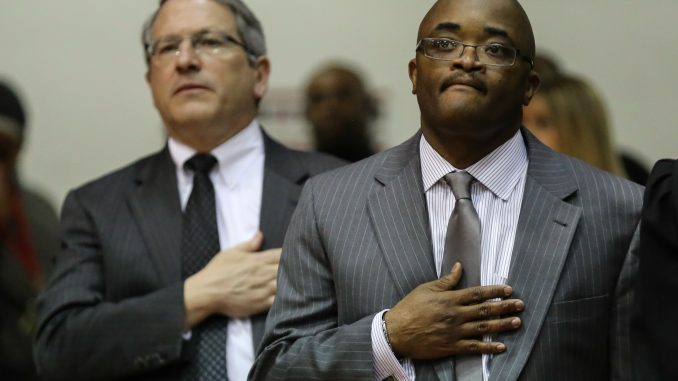
The U.S. Department of Education Office for Civil Rights is investigating Temple’s athletic department for possible failure in providing equal opportunities for its female student-athletes, according to an email President Theobald sent to coaches and Board of Trustees members on Feb. 11.
According to the email, the investigation into the university is regarding locker rooms, facilities, financial assistance, housing and dining.
The investigation was first reported by the Inquirer.
Failure to meet Title IX standards was one of the primary reasons the administration said it used in its decision to cut seven sports in December. The OCR discourages athletic cuts because it is “contrary to the spirit of Title IX,” according to a spokesperson. Federal funding has never been denied to Temple or any other non-compliant university since Title IX, the gender-equity law, was passed in 1972.
Theobald, who said in the email that the notification was “not unexpected,” also provided an update on the administrative review that has occurred since he met with representatives of the cut teams on Jan. 28. No new information was provided on a suggested renovation of the East Park Canoe Boathouse that could spare the men’s crew and women’s rowing programs from elimination.
When addressing the board in the email, Theobald said a recommendation was approved at the time of the cuts to convert softball, men’s crew and women’s rowing to club sports. Theobald said on Jan. 28 that the university would bridge-fund the cut programs to allow them to compete as club sports.
Among the most prominent suggestions made by members of the baseball team is the continued use of Campbell’s Field, a Rutgers-owned facility located in Camden, N.J. Last fall, Temple secured a one-year deal to play 11 of its 20 home games at the stadium. Theobald said in the email that the university is paying $2,000 per game to use the facility and cited potential scheduling issues due to space being shared with other teams.
Temple, which has a contract for its football program with the Philadelphia Eagles, has also considered a partnership with the Philadelphia Phillies, Theobald said. In return for using Citizens Bank Park, student-athletes would be required to run clinics and manage an urban youth outreach program. Theobald said that additional staff would be necessary for such a venture, and that the university “does not have the resources to hire the additional staff required to make this option viable.”
There have been other suggestions for potential baseball and softball locations, as Theobald said that the university has consulted the Smith Group – Temple’s master planners – to assess such options. The group concluded that in order to bring the locations to Division I standards, the venture would be a “substantial” financial investment. One of the proposed fields is Richie Ashburn Field at Roosevelt Park, which Villanova used for four years until 2002.
The men’s gymnastics team currently shares space with the women’s gymnastics team. Although coach Fred Turoff and student-athletes say facilities are not a significant enough reason to warrant the cuts, Theobald remains skeptical.
“Gymnastics requires significant equipment for practice and meets, and it will be costly, time consuming, and impractical to set up and break down equipment to accommodate sharing the space with another sport,” Theobald said in the email to coaches.
One of the primary ideas proposed by the T7 Council, a group of parents and alumni formed to fight the cuts, is to give each cut team five years to reach self-sustainability. Theobald said that the fundraising campaign necessary to reach such a goal would need to bring in the highest amount of donations in Temple’s history – estimating that more than $60 million is necessary to meet annual operating costs of the teams. Temple has one of the lowest fundraising campaigns in the American Athletic Conference, although its donation total increased 36 percent and reached an all-time high during the 2012-13 year.
Theobald said that the administration will continue its review of suggestions raised by the cut teams.
“At this point, I remain convinced that the difficult decision to right-size our program and create a sustainable model for Temple athletics moving forward remains in the best interest of all of our 39,000 students and for Temple University as a whole,” Theobald said in the email.
A meeting of the athletics committee of the Board of Trustees is scheduled for Feb. 26.
Avery Maehrer can be reached at avery.maehrer@temple.edu or on Twitter @AveryMaehrer.


I wonder what credentials are possessed by the president and the athletic director that qualify them for their roles. I wonder why the student body has not organized vigorous protests against such devastation to the overall prestige and image of TU. I wonder how many student council meetings have been held on this topic and what the consensus was on this issue. Aside from the federal involvement, I wonder what actions may be taken by the various local and state executive and legislative authorities. This article may have been more correctly titled “Temple University faces federal investigation”. I wonder why the president did not follow the model used by so many professional consultants who perform organizational studies and conduct a vigorous campaign of formal surveys to measure the possible reaction of various stakeholders (students who are athletes as well as students who are not athletes, employees, neighbors, alumni, parents, community leaders, etc.) to possible decisions before making the decision. Why isn’t cheerleading considered a sport?